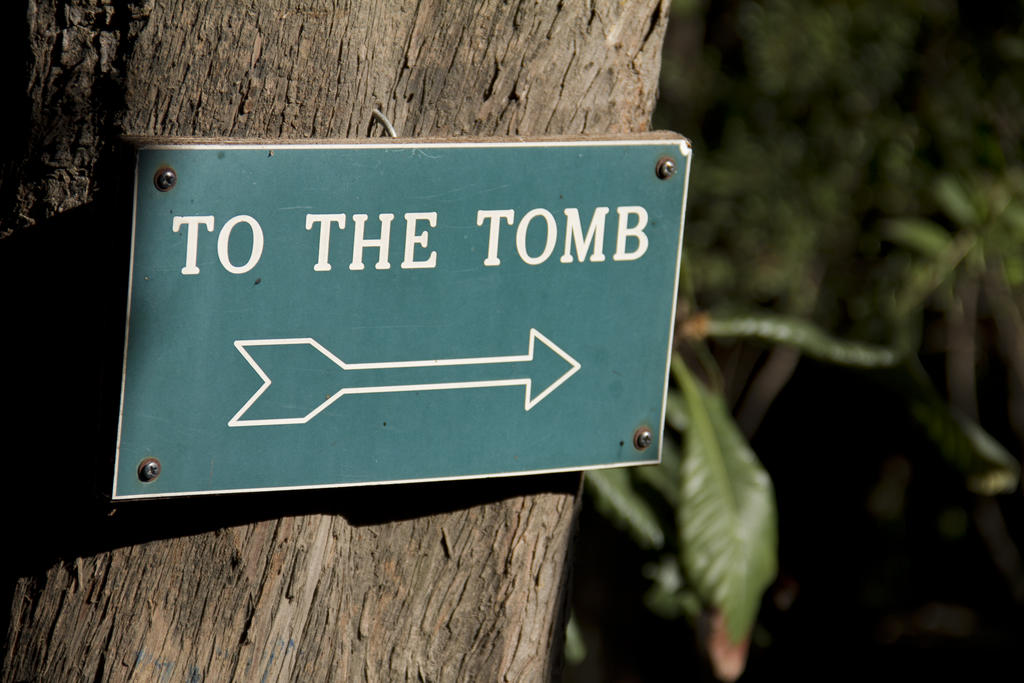What images and memories does the term Easter bring forth in your mind? For many of us, we can remember fondly events like Easter Egg hunts, gift baskets, and the like. Or perhaps less fondly, you remember being forced to take pictures with people in creepy giant rabbit costumes. Maybe you grew up in a home that went to church on Easter, so you remember singing songs, participating in reenactment plays as a child, and family meals after service.
Whatever your religious affiliation is or your exposure to Westernized Easter events has been, I think all of us have some sort of idea of the Christian resurrection story that Easter is based around. While you might not know or remember the details of this story, you know that there was a man named Jesus who died on a cross and three days later was raised to new life. At the root of this resurrection story is one central image: a large, incredibly heavy rolled-away stone and the empty tomb that it revealed.
What is the purpose of this empty tomb? Why was the stone rolled away? The answer for most of us is probably something like this: Jesus came back to life, got up, used miraculous strength to roll away the stone, and walked out of the tomb.Hence the rolled away stone and the empty tomb. But is that what really happened? Is that why the tomb was empty?
Immediately after the discovery of the empty tomb in John 20 we read of the first time Jesus appears to the disciples. Eight days later, Jesus again appears to the disciples in the same house. Both times, the author John goes out of his way to tell us that the doors of the house were locked, and yet Jesus suddenly appeared among them. Let that one bake your noodle for a second. The doors are locked, you’re surrounded by solid walls, and Jesus just physically appears amidst a group of people. We can debate the physics of this all we want – but the point is, solid objects couldn’t stop him.
So that begs the question, was the stone at the empty tomb really rolled away so Jesus could get out? Physical objects obviously were not a barrier for him. Had he wanted to, Jesus could’ve gotten up and left the tomb without ever having to roll away the stone.
When Simon Peter and John first showed up to the empty tomb, we read of how Simon Peter went in to the tomb and saw the grave cloths and the empty tomb for himself. You see, the stone wasn’t rolled away so that Jesus could get out, but so that we could get in.
When I asked you what images or memories the term Easter brought to your mind, what were they? Were they fond memories of celebrating with your family – memories such as church services, meals, holiday events, or dying eggs together? For many of us, there are no fond memories. Maybe it was just another day as any. Maybe you have sad and haunting memories of hypocritical parents who put on a good face at church but then came home and lived a life completely opposite of what they showed on Sunday morning. Maybe you didn’t have family meals and events because your family was so broken that a meal together was the last thing you ever would have done.
The first words of Jesus to his disciples after the resurrection were “Peace be with you” (John 20:19). Peace is a loaded term in our culture, but what Christ is talking about here isn’t a non-violent state of being between two or more parties. Peace is with us because his resurrection is proof that he alone has the power to bring true restoration, true healing, true beauty, true hope, true comfort and true love. Wherever you are this Easter Sunday, the empty tomb is for you. It is an invitation: come in and see that Christ has defeated death – just as he said he would. He has taken our shame and our guilt for us – just as he said he would. He has brought hope, comfort, and joy eternal – just as he said he would.
The tomb is empty, will you come in and see?
My family and I moved from our home in South Dakota in 1997 and traveled halfway across the country to Northern Virginia. I had grown up in the same small town there for almost 10 years, so this was an exciting but equally hard move for me. One of the most difficult things for me at the time was leaving my grandparents who I was very close to and facing the fact that I wouldn’t be able to see them whenever I wanted to anymore.
Both of my parents worked until late afternoon/early evening and faced long commutes, so for two years I attended an after-school care program at my elementary school. Since staying late at this program was normative, it was always a special treat when one of my parents got off work early and came to pick me up, because I knew that meant I would get to go home and have extra time watching TV or whatever it was I did back then.
I’ll never forget the day my father came to pick me up early from school one day. I was so excited to go home and have some extra fun. What I didn’t know was that this day was not going to be fun at all, but instead was going to be my first experience with death and mourning.
I remember walking in the door and seeing my mom sitting in the kitchen crying. I asked her what was wrong, and she gently put her hand on my shoulder and said, “Grandma went to sleep last night, and never woke up.”
Now, my little 10 year old mind had never comprehended death before – but I knew what it was. I instantly knew that this meant Grandma had passed away. After crying with my parents for a short time, I remember going up to my room and crying/thinking in solitude. And it was during that time alone that somehow my little brain genuinely convinced myself that what my mom actually meant was that Grandma had simply gone into a deep coma, that she didn’t really die. And so that was how I interpreted life for the next few days.
The night before I left for the funeral (somehow I didn’t realize that was what we were leaving for), my after-school counselor said to me, “Ben, I’m really sorry to hear about your Grandma’s passing.” Passing? I thought he was crazy! After all, Grandma hadn’t passed away, she was just asleep. So I ignorantly refuted him, “Dead!? No, not dead. She’s just in a coma. If she was really dead, I’d be a disaster!”
My father came to pick me up soon after, and I remember saying to him in the hallway at the school as we left, “Dad, isn’t it crazy that my counselor thought Grandma was dead? How crazy is that, right?”
Then I heard the words that my mind had been trying to shelter me from for three days.
No Ben. Grandma really did die.
I lost it. I broke down in the hallway and cried all the way home.
Now, you can chalk up my experience to the mental capacity of a 10-year-old and my inability at the time to process death. And I’m sure this is partially true. But I think my experience reveals something deeper about the reality of death: nobody ever gets used to it. Talk to anyone who deals with death on a regular basis (such as a soldier or a doctor/nurse) and they’ll tell you that nobody ever becomes adjusted to death, and if they do its because they’ve become numb to some other part of life as a coping mechanism.
See here’s the thing about death – it was never meant to be something we get used to because it was never supposed to be something we deal with. Death is an anomaly in creation; it shouldn’t exist.
But death does exist. Through our conspiracy and responsibility in the act of turning from God, we’ve brought the punishment of death, disease and decay upon ourselves.
For all the emphasis we have on justification and forgiveness of sins in the Christian life, I think we often forget the fact that through the work of Christ God is restoring all things to himself. He is making all things new. Read what Paul says in the first epistle to the Thessalonians:
But we do not want you to be uninformed, brothers, about those who are asleep, that you may not grieve as others do who have no hope. 14 For since we believe that Jesus died and rose again, even so, through Jesus, God will bring with him those who have fallen asleep. (1 Thessalonians 4:13-14)
We need not grieve as those without faith in Christ would grieve. Because Jesus has overcome death and the grave, through faith we too share in his victory. Like Christ, we will rise and some day be glorified, being made like him as he makes all things new.
Christian, don’t forget that in the gospel we have much more than our forgiveness of sins – although certainly not less. Through the gospel we have all of Christ; his righteousness, his sonship, and his victory – even over death.


